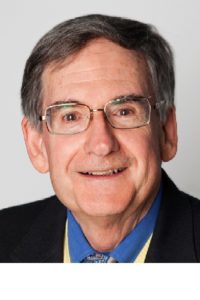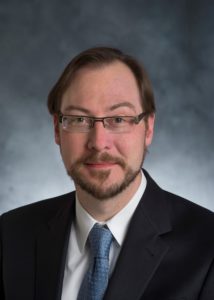Meet the 2018 Candidates for 1st Vice President
Updated: Voting is now open. Deadline to vote is 24 September at 12 PM (Noon) ET.
Next up in our featured posts on this year’s elections are the two candidates running for 1st Vice President: Dennis J. Frailey and Forrest Shull.
The candidate elected to the office of 1st Vice President will serve a one-year term starting 1 January 2019.
Similar to the position of 2nd Vice President, the 1st Vice President has two vital functions to the organization. One, they provide counsel and assistance to the president and other volunteer leaders, and two, they provide leadership and directions for officers and society programs. They are second in succession to the Computer Society President, and first in succession to the President-elect.
To learn more of other positions up for election this year, click here to read the position statements and bios of the 11 candidates running for the Board of Governors and the post on the candidates running for 2nd Vice President. Plus, look for the final post on the two candidates for President-Elect 2019/President 2020 later this week.
Remember, voting begins on Monday, August 6. The candidates running for 1st Vice President with their position statements and biographies are listed in alphabetical order.
 Dennis J. Frailey
Dennis J. Frailey
Position Statement
Why should someone join the Computer Society today? What is the value proposition? Our own technology has changed the answers to these questions as traditional forms of publication and communication are being transformed. No longer does the young student, faculty member, researcher, or working professional turn to printed journals as a primary source of knowledge. They look online and expect things to be free (or at least low in cost). Those who publish research results seek to publish quickly—a capability that our technology has made possible. Professionals, researchers, faculty members, and students have always been the vital components of Society membership, both as volunteers and as consumers of Society products and services. To remain viable, the Society must remain valuable to them. Our publications have gone electronic and our website is being enriched. Webinars and other educational programs are growing. But what else should we be doing?
Since my election as Second VP last year I’ve been delving into these questions. I’ve been a working professional for over 40 years and a publisher of technical papers, as well as a part-time college-level professor and speaker to many local groups through the DVP and other programs, so I’m familiar with these communities. We need to spend more time listening to them. Society leaders are mostly from a previous generation, and we don’t always “get” what the younger members need. We should find ways to involve more of them in leadership positions within the Society. We need better alignment of Society activities that support local chapters, regional conferences, and other events that serve their interests. As a society VP, I’ve had the opportunity to bring Society resources to bear on these objectives, and I ask your support to let me continue the job.
Biography
Frailey is a retired Principal Fellow from Raytheon Corporation with over 50 years of professional service in IEEE, ACM and other computing technical societies. He’s an IEEE Senior Member and ACM Fellow and has served in many capacities for both societies, notably the Board of Governors of the Computer Society (2011-16), 2nd VP and Secretary of the Computer Society (2018), and Vice President of ACM (1986-88). As a speaker for the ACM’s DSP and the Computer Society’s DVP, Frailey has spoken to over 200 chapters on such topics as careers in computing, cycle time reduction, and techniques used by software engineering professionals. He’s also served throughout his career as an adjunct professor at several universities, where his recent courses focus on software quality, software metrics, and software project management. Earlier in his career he had publications and taught courses in operating systems, compiler design, and computer architecture.
Frailey has spent much of his professional life bridging gaps between industry and academia. He’s an active participant in groups defining academic curricula and bodies of knowledge in computing fields and helped with the formation of several computer science and software engineering programs. He was a member of the Computer Society’s Professional Activities Board and vice chair of the Education Activities Board before the two were merged in 2013. He was an ABET accreditation program evaluator for over 25 years, and has won several awards for contributions to computer science and software engineering education. He served on five industry advisory boards for university computer science, computer engineering, and software engineering programs. Frailey has also been active throughout his career in support of conference activities including various committees, keynote addresses, papers, and as program chair for over a dozen conferences. He holds an MS and PhD in computer science from Purdue University.
 Forrest Shull
Forrest Shull
Position Statement
The Computer Society is going through a transformative time. There are very different expectations about what membership should mean, what products and services consumers find valuable, and how users find and consume our content.
Our publications, for example, have experienced a profound transformation. Content now largely reaches consumers digitally, piecemeal through search engines, rather than through subscriptions. In various roles, including Editor in Chief of IEEE Software, I have helped manage this transition, spearheading the digital edition of a leading magazine and managing engaged volunteers who worked to take advantage of the new media. Today we are reaching audiences in new ways and with new types of content, for example, the interviews on timely topics through the SE Radio podcast.
To have a healthy Society, we need to be nimble enough to adapt our offerings to current expectations. We need to continue to be forward-thinking and able to innovate, but also be clear-eyed about which of our offerings are finding an audience and adapt as necessary. I have helped develop review processes that today give us a better baseline for understanding how well our current offerings meet the needs of the community, and for making strategic decisions informed by data. But there is much more to be done. Above all, we need to do a better job of connecting our members, and finding energized individuals across the Society who can help better develop our content and communicate the many exciting advances that our members are involved in.
I have served the Society in several different roles—in Publications, as Treasurer, and now as VP for Membership and Geographic Activities. I hope to have the opportunity to continue working with stakeholders from across all parts of the Society to better understand how we serve the computing community and continue to improve.
Biography
Forrest Shull is Assistant Director for Empirical Research at Carnegie Mellon University’s Software Engineering Institute (SEI). His role is to lead work with US government agencies, national labs, industry, and academic institutions to advance the use of empirically grounded information in software engineering and cybersecurity. Prior to SEI, he was at the Fraunhofer Center for Experimental Software Engineering, where he founded and served as Director of the Measurement and Knowledge Management Division.
He has been a lead researcher on projects for the US Department of Defense, NASA’s Office of Safety and Mission Assurance, the Defense Advanced Research Projects Agency (DARPA), the National Science Foundation, and commercial companies.
While Editor in Chief of IEEE Software (2011-2014), he launched the digital edition of the magazine, leading to new subscribers. He created the annual Software Experts Summit, which forged connections with local software industry in cities worldwide. He incorporated the free Software Engineering Radio podcast into Software, and maintained the high quality which helps each episode reach 40–50,000 downloads. He currently serves as Associate Editor of IEEE Transactions on Software Engineering. He has served in leadership roles on IEEE conferences including ICSE, ESEM, and STC.
Since 2015 he has been a member of the Computer Society Board of Governors and three times served on the Executive Committee, where he has helped institute a metrics-based Portfolio Review initiative, which reviews all of the Society’s member offerings for vitality and ongoing relevance to membership. He has served as Society Treasurer, Finance Chair of the Publications Board, and VP for Membership. He is an IEEE Senior Member and a Computer Society Golden Core Member.
He received his PhD in 1998 from the University of Maryland College Park. He is the author of 100 peer-reviewed publications and co-editor of a handbook on empirical software engineering.

Leave a Reply